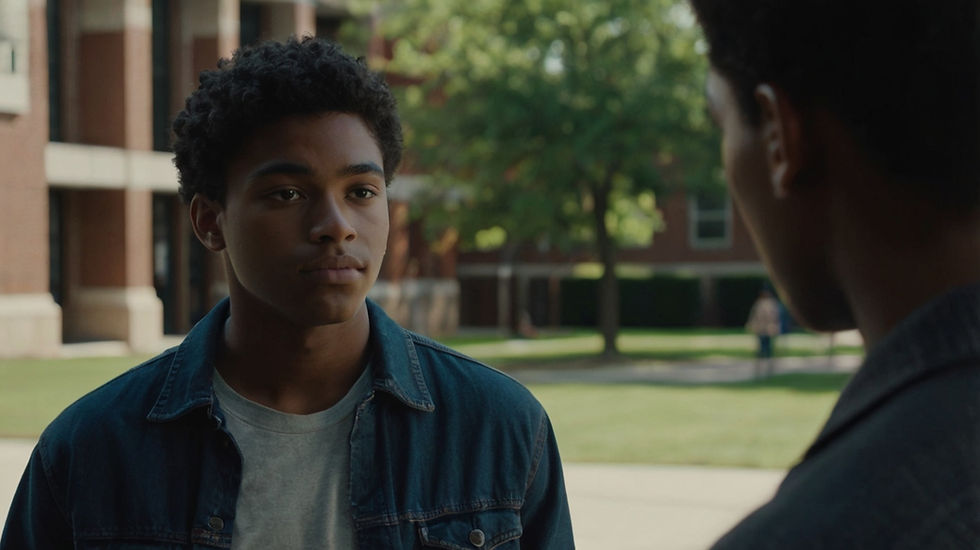A College Girl’s Story of Betrayal by the People She Loved Most
- Amelia

- Jul 20
- 4 min read
Updated: Aug 27
It started like a dream.

Sofia had just entered her second year at university when everything seemed to fall into place. She had made the Dean's list, secured a leadership role in her campus literary club, and was in what she believed to be a loving relationship with her boyfriend, Daniel. They met during a freshman orientation event and instantly clicked. He was attentive, charming, and kind. Their relationship was the kind that others admired—warm Instagram posts, coordinated campus events, and late-night study sessions in the library.
And then there were her friends—Jade and Lila. The three of them had been inseparable since their first group project. From dorm room sleepovers to venting about professors, they shared everything. Or so Sofia thought.
The First Red Flag
Things started to shift subtly during the spring semester. Daniel, once overly eager to meet Sofia after class, began rescheduling or claiming he was swamped with coursework. Meanwhile, Jade and Lila started pulling away, often hanging out without including her, brushing it off as “accidental” or “last-minute plans.”
Sofia shrugged it off. College was stressful—people get busy. But there was a night she couldn’t shake from her mind.
She was heading back to the dorms early after a canceled seminar. As she turned the corner near the student union, she saw Daniel—laughing with Lila. They weren’t doing anything obviously wrong, but it was the kind of laughter shared between people who had inside jokes, the kind that stung when you're not in on it.
The Text That Changed Everything
Two weeks later, a message popped up on Sofia’s phone from an anonymous number. It read:"You deserve to know the truth. Check Daniel's Snapchat—he deletes chats."
Her heart raced. She wasn't the type to snoop, but her gut told her something was off. That evening, she waited until Daniel fell asleep beside her during one of their rare movie nights. With trembling fingers, she opened his phone using the fingerprint access he had casually set up for convenience.
There it was. A string of saved and unsaved messages, photos, and voice notes—flirty, explicit, undeniably intimate—between Daniel, Lila, and Jade.
It wasn’t just one betrayal. It was two. Her boyfriend and her best friends.
Confrontation and Denial
The next morning, Sofia confronted Daniel.
“I know about Lila and Jade,” she said calmly, holding up his phone.
His face drained of color. For a moment, he said nothing—then stumbled over a weak excuse. “It was a mistake. I didn’t mean for it to happen.”
But it wasn’t just a one-time thing. The timestamps showed months of deceit. What broke Sofia the most wasn’t the physical cheating—it was the emotional intimacy, the secrets exchanged, the trust broken.
When she messaged Jade and Lila, their replies were worse.
“You were always too perfect. We were tired of pretending.”
“Daniel said you were distant. We were just trying to be there for him.”
It wasn’t remorse. It was blame-shifting.
The Fallout
The betrayal rippled through Sofia’s life like an earthquake.
She stopped attending club meetings. Her grades slipped. She avoided the dining hall, afraid to run into any of them. Mutual friends tried to stay neutral, but Sofia felt their discomfort when choosing sides. The loneliness was crushing.
She began questioning everything—her judgment, her self-worth, her ability to trust. For days she couldn't eat. Nights were filled with panic attacks and uncontrollable crying spells.
According to Psychology Today, betrayal by close friends or partners activates the same part of the brain involved in physical pain.
It wasn’t just heartbreak. It was trauma.
Rebuilding From Zero
Sofia realized she needed help. She scheduled a session with the campus mental health center, where she was diagnosed with situational depression. Her therapist guided her through the stages of grief—not just of the relationship, but of friendships lost and the identity she once held as a happy, confident student.
She slowly started writing again—not essays, but journal entries. One entry turned into a blog post. That post was shared among her peers. Messages started flooding in—other students who had been betrayed, hurt, or ghosted by those they loved.
It became a turning point.
Many students experience emotional trauma during college years, and peer betrayal is increasingly common in close-knit campus environments (National Institutes of Health (NIH)).
A Letter She Never Sent
Months later, she wrote a letter—not to get closure, but to release the weight of silence.
“To the ones I trusted most,You didn’t just betray me—you destroyed the safest space I ever had. But I refuse to let your choices define me. I am not broken. I am rebuilding. And I am stronger without you.”
She never sent it. She didn’t need to. It was for her healing, not their guilt.
Life After Betrayal
Sofia joined a student wellness initiative that advocated for mental health and emotional resilience. Her story became part of a campaign titled “Unmasked,” where students anonymously shared their stories of struggle and survival. Her voice, once silenced by pain, became a source of strength.
She made new friends—ones who appreciated her without needing her to dim her light. She started trusting again, slowly. She even laughed again—real laughter, not the kind that covers up sadness.
Betrayal doesn’t just end something—it can begin something new, something stronger. (verywellmind)
Final Thoughts
Betrayal is one of the most painful lessons life can offer, especially when it comes from those closest to you. But it’s also one of the most transformative. Sofia’s story is not just about heartbreak—it’s about the journey back to herself.
Her past didn’t define her. Her response did.
And today, she walks campus not as a victim—but as a survivor, a writer, and a voice for those who’ve felt the same pain in silence.






Comments